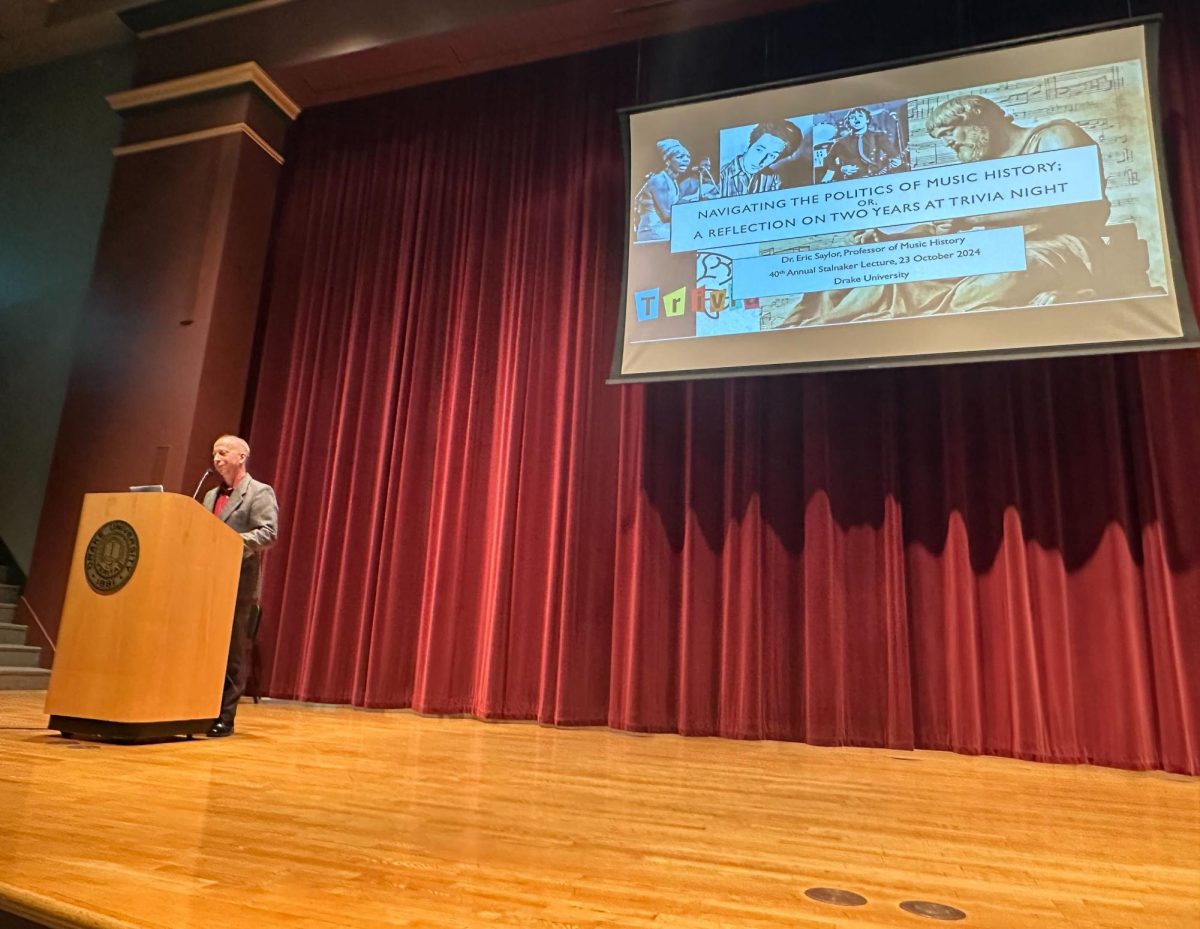“I have lost track of how many times we’ve been in the top three spots headed into the endgame only to exchange some blank stares because none of us have ever heard this song or singer before or we can’t remember or never knew the band that performed ‘Stuck in the Middle with You,’” Eric Saylor, professor of music history at Drake and this year’s Stalnaker Lecturer, said.
On Wednesday, Oct. 23, the College of Arts and Sciences presented the fortieth annual Stalnaker Lecture, “Navigating the Politics of Music History; Or A Reflection on Two Years at Trivia Night.” The lecture posed the question, “Why does the Drake Music faculty’s trivia team consistently fall short during the final round of trivia at Confluence Brewing Company, ‘Name that Tune?’”
Saylor spoke on a plethora of topics throughout the lecture, including politics, Greek philosophy, history, education, art, music and more, at one point even inviting a group of four students to take the stage to perform a piece of French music from the early 1400s. This served as an example of English influences manifested in French music during the period.
As a musicologist, Saylor is a verbose and exact public speaker with the ability to keep his audience engaged while not derailing the presentation, often with a dry and sarcastic sense of humor.
“I thought he was very funny,” said Anna Blader, a junior at Drake studying music business. “I particularly think that he shined in his Q&A section.”
Saylor stated that he thought most people would find the piece “an attractive little song” only to subvert audience expectations after its performance, when he showed the translated lyrics on his presentation. The translation reveals that the song is quite tragic, having been written about the death of the composer’s husband. This example served to illustrate that the song didn’t contain any of the signals we would expect from such a piece in 2024.
“This undercuts the idea that music is a universal language or that musical sounds carry intrinsic qualities that should govern their application of use,” Saylor said. “Put simply, different people get different things out of a given piece of music.”
Saylor stated that, as a musicologist, he pulls from an array of disciplines besides music to understand how a piece works, who makes it, who listens to it and why it matters.
“The answers to these questions are varied and complex. Any historian in any field will acknowledge this reality,” Saylor said. “This would be a problem for two kinds of people: those who like simple and easy explanations and those who don’t actually know what history is.”
The concept of “truthiness,” a term coined by Stephen Colbert in the first episode of “The Colbert Report,” is defined as the belief that what you feel is truer than what is supported by fact. Saylor used this term as a way to explain people’s aversion to history being a revisionary discipline, rather than a cut-and-dry understanding of the subject matter.
“History is a qualitative discipline,” Saylor said. “There’s tons of things that you can look at and all kinds of different ways that you can interpret it.”
Bringing the lecture full circle, Saylor re-stated the question that kicked off the night: “Why doesn’t the music faculty do better in Name that Tune at trivia night?”
“It’s not because we’re charlatans or frauds, rather, it’s because our relationship to music differs significantly from that of the average person that shows up to Confluence every other Monday,” Saylor said. “To put it in Aristotelian terms, we deal with music more as an art than as entertainment.”
At the end of Saylor’s lecture, the 2025 Stalnaker Lecturer was announced by Dr. Inbal Mazar to be Dr. Maria Valdovinos, a professor of psychology at Drake. The 41st Stalnaker Lecture will take place in October of next year.








